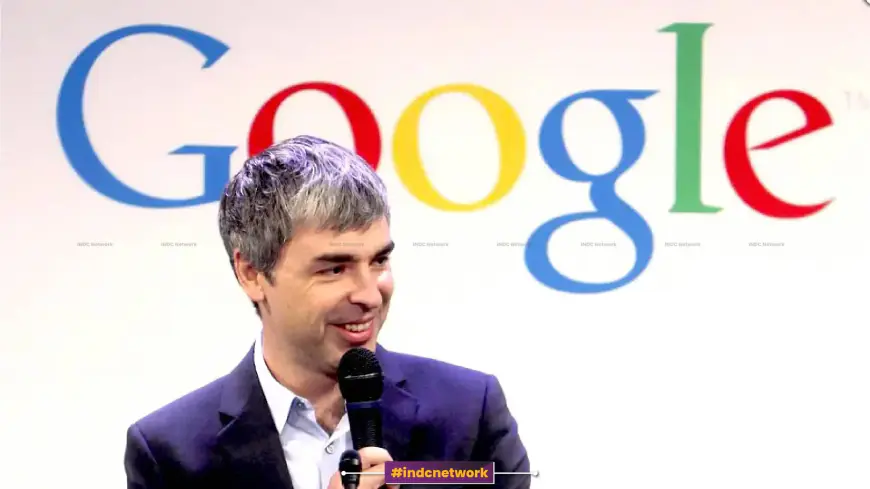The Curious Mind That Built Google: Larry Page’s Journey from Dorm to Digital Domination
Larry Page, the co-founder of Google, transformed the way the world accesses and organizes information. With a relentless focus on innovation, he and Sergey Brin turned a university project into one of the most influential companies on the planet. This article delves into Page's life, his vision for Google, and his role in shaping the future of technology.

INDC Network : Biography : Larry Page: The Visionary Engineer Behind Google
When we think of transformative technology and the internet revolution, one name consistently stands out: Larry Page. As the co-founder of Google, Page has been instrumental in reshaping how humanity accesses, processes, and utilizes information. His innovative thinking and engineering brilliance turned a simple idea into one of the most powerful tech companies in history.
Early Life: A Childhood Rooted in Technology
Larry Page was born on March 26, 1973, in East Lansing, Michigan. His parents, Carl and Gloria Page, were computer science professors, and their influence on young Larry was profound. Growing up in a household surrounded by technology, he developed a passion for computers and innovation.
As a child, Page was fascinated by inventions, robotics, and the potential of computers. This curiosity drove him to pursue a Bachelor of Science degree in Computer Engineering from the University of Michigan and later a Ph.D. in Computer Science at Stanford University.
The Birth of Google: A Search Engine Revolution
In 1995, while at Stanford, Larry Page met Sergey Brin, a fellow computer science student. Together, they embarked on a research project to improve internet search capabilities. Their groundbreaking idea was to rank websites based on their relevance and backlinks—a concept they called PageRank.
This innovation laid the foundation for Google, a search engine they launched in 1998. Unlike other search engines at the time, Google provided faster, more accurate results by leveraging PageRank.
Initially housed in a garage, Google quickly gained popularity due to its minimalist design, user-centric focus, and unmatched efficiency. By 2000, Google became the world’s largest search engine, indexing over one billion pages.
Google’s Growth and Milestones
Under Larry Page’s leadership, Google evolved beyond a search engine to become a tech powerhouse. Key milestones include:
- AdWords (2000): Google’s advertising platform revolutionized digital marketing, making it a cornerstone of the company’s revenue model.
- Acquisition of YouTube (2006): This purchase positioned Google as a leader in online video content.
- Android (2005): Acquiring Android Inc. laid the groundwork for Google’s dominance in the mobile operating system market.
- Google Maps (2005): A game-changer in navigation and geospatial services.
- Cloud Computing: Google Cloud became a major player in enterprise solutions.
- Artificial Intelligence: Google’s investment in AI, particularly through DeepMind, has advanced the field significantly.
Alphabet Inc.: Restructuring for Innovation
In 2015, Larry Page spearheaded the creation of Alphabet Inc., a parent company for Google and its subsidiaries. This restructuring allowed Google to focus on its core products while enabling other ventures, such as Waymo (autonomous vehicles), Verily (healthcare), and Google X (moonshot projects), to flourish.
The move demonstrated Page’s forward-thinking leadership and desire to foster innovation across diverse fields.
Larry Page’s Leadership Style and Philosophy
Page’s leadership style is often described as quiet yet visionary. Unlike outspoken tech leaders, he prefers to let his work speak for itself. Key aspects of his philosophy include:
- Moonshot Thinking: Page encourages tackling ambitious, seemingly impossible projects. He believes in aiming for 10x improvements rather than incremental changes.
- Focus on the User: Google’s core principle—“Focus on the user, and all else will follow”—is rooted in Page’s belief in user-centric innovation.
- Emphasis on Data: Page values data-driven decision-making, ensuring that innovation is grounded in evidence and potential impact.
Challenges and Controversies
Despite its success, Google has faced significant challenges during Page’s tenure:
- Privacy Concerns: Google’s extensive data collection practices have sparked debates over user privacy and surveillance.
- Antitrust Issues: Regulators worldwide have scrutinized Google for monopolistic behavior, particularly in search and advertising markets.
- Workplace Culture: Reports of discrimination and workplace harassment have raised questions about the company’s internal culture.
- AI Ethics: As a leader in AI, Google has been criticized for ethical lapses, such as biased algorithms and controversial contracts.
Page has often avoided the spotlight during these controversies, delegating responsibilities to other executives.
Impact on Society
Larry Page’s work has fundamentally altered how people interact with information and technology. His contributions include:
- Democratization of Knowledge: Google has made information accessible to billions, bridging knowledge gaps worldwide.
- Advancing AI: Through projects like Google Assistant and DeepMind, Page has pushed the boundaries of artificial intelligence.
- Digital Advertising: Google’s advertising tools have enabled businesses of all sizes to thrive in the digital age.
- Connectivity Projects: Initiatives like Project Loon and Google Fiber aim to bring connectivity to underserved regions.
Beyond Google: Larry Page’s Vision for the Future
While Page stepped down as Alphabet’s CEO in 2019, his vision continues to shape the company. He remains involved in philanthropic efforts and experimental ventures like:
- Healthcare Innovation: Page has invested in projects addressing longevity and healthcare challenges.
- Sustainable Technology: His focus on renewable energy and environmentally friendly technologies reflects a commitment to sustainability.
- Autonomous Vehicles: Through Waymo, Page envisions a future where self-driving cars transform transportation.
Legacy and Inspiration
Larry Page’s journey from a curious boy fascinated by technology to the co-founder of a global tech giant is a story of perseverance and innovation. His work has inspired countless entrepreneurs, engineers, and dreamers to think big and pursue bold ideas.
While controversies and challenges remain part of Google’s narrative, Page’s contributions to technology and society are undeniable. His vision of organizing the world’s information and making it universally accessible has transformed lives and industries alike.
What's Your Reaction?














































































































































































